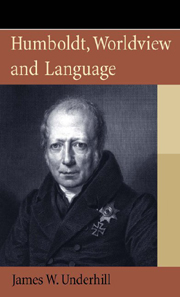Book contents
6 - Whorf
from Part I - Language and World
Published online by Cambridge University Press: 12 September 2012
Summary
Accounts in English of the relationship between language and worldview and theories of linguistic relativity have tended to concentrate on Whorf's position, and consequently the influence of his work has been acknowledged more fully by scholars and studied in greater detail than either Boas' or Sapir's work. Perspicacious and stimulating accounts can be found in Malotki (1983), Lee (1996) and Lucy (1996), but if we are to understand the way thought concerning the relationship between language and worldview has tended to be limited to Whorf's ideas in debates in English-speaking circles, it will be necessary to give a brief outline of this linguist's ideas in the pages that follow.
Whorf's work is one of great scope and rigour. He takes us beyond the isolated concepts in language that Boas focused upon, he assimilates Sapir's idea of language as a system in which concepts and categories might be described as interwoven or might be said to position themselves in relation to one another. As early as the 1920s, Sapir had begun developing his concept of patternment: and this was to be of crucial importance for the development of Whorf's linguistic thought (Lee 1996: 34–53). Contrary to the inevitably atomistic bent of modern linguistics with its stress upon the specialised analysis of linguistic particulars in isolation from the act of speaking, Sapir (and later Whorf) underlined the importance of considering the meaning of each element of language within the context of the pattern as a whole.
- Type
- Chapter
- Information
- Humboldt Worldview and Language , pp. 33 - 50Publisher: Edinburgh University PressPrint publication year: 2009



